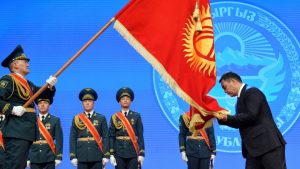Following the collapse of the Soviet Union, the West had high hopes for the success of democracy in Central Asia. Central Asian leaders, although exhibiting many classic authoritarian features, promised reforms and benefitted from access to global markets without following through on the democratic transformations that many observers had hoped for.
No country in Central Asia has advanced democratically as quickly as many Western officials in the 1990s had hoped. In fact, four out of five countries in Central Asia have been consistently listed by Freedom House as fully consolidated authoritarian regimes. After its 2020 revolution, Kyrgyzstan joined that list.
Kyrgyzstan is unique within Central Asia because, at one point, the country appeared to be on a path to real democratic representation. Two previous revolutions, one in 2005 and the other in 2010, ousted authoritarian leaders and instilled a parliamentary form of government. The 2010 revolution also resulted in Kyrgyzstan’s first peaceful transition of power, which took place after relatively free and fair presidential elections. Although Kyrgyzstan continued to be plagued by some systemic problems, including corruption and human rights abuses, the 2010 revolution marked a hopeful turn for an empowered legislature and decentralized presidential power in Kyrgyzstan.
This parliamentary experiment in Kyrgyzstan lasted until October 2020, when the third revolution in 15 years began after a messy parliamentary election. In the midst of the chaos, populist politician Sadyr Japarov rose to power after being broken out of prison by his supporters. Japarov’s presidency has been marked by traditional and nationalist appeals to Kyrgyz citizens, which have especially taken root in rural communities and bolstered his image as a man of the people. Since coming to power, Japarov has maintained a support base through consistent populist policies and rhetoric. He has used his popular support to change Kyrgyzstan’s constitution to tighten executive power and curb liberal freedoms in the country in the name of “the people” — claiming that only he knows what is needed to stabilize the country and that he is the legitimate, elected leader of the Kyrgyz people.
Japarov’s actions are significant within the framework of Kyrgyz and Central Asian politics because he represents a shift from old-school authoritarianism to new-wave methods of consolidating illiberal, autocratic power under the guise of popular support. Japarov’s proposed constitutional changes were decided upon in a 2021 referendum that he called just three months after his initial election. The new constitution reduced the size of the parliament and granted the president greater legislative power, as well as getting rid of the one-term limit on the presidency.
Japarov’s style of consolidating autocratic power is representative of broader geopolitical trends toward ethnonationalism, nativism, and populism. These forms of political rhetoric are significant because they are used to appeal to mass audiences and manipulate public opinion to support illiberal measures garbed in the style of democracy. Old-school authoritarianism relied on complete, blind obedience, leaving little room for personal opinions or discourse and relying heavily on fear of the government or police institutions. On the other hand, new authoritarianism is concerned with justifying and legitimizing autocratic power by appealing directly to the public via populist rhetoric that claims to know the needs and desires of “the people.” New authoritarian leaders reshape politics through propaganda that manipulates the worldview of citizens and frames the leaders’ actions as what is best for the nation and the public.
Japarov’s populism spread rapidly through social media platforms, which make it easier for modern-day autocrats to generate direct appeals to their constituents. In an interview with Kommersant in January 2021, Japaov famously claimed to have generated a revolution via social media by managing over 50 different WhatsApp, Telegram, and Facebook channels. Japarov used social media to appeal to rural, Kyrgyz-speaking voters, and he wrote most of his posts in the Kyrgyz language. Many of his posts utilize populist language, employing divisive and hostile rhetoric to differentiate the Kyrgyz people from the “corrupt elite.”
There are hundreds of social media groups that regularly post content supporting Japarov, including a Facebook group with nearly 198,000 members where users make daily posts in support of Japarov and his policies. Japarov has been compared to former U.S. President Donald Trump, as his power derives from and relies on an unusually high number of social media followers. Social media followings can and do result in real-life mobilization, which can be demonstrated from his continued widespread support spanning thousands of users across various platforms.
In Kyrgyzstan, Japarov’s social media campaign was significant because it gave the people a platform to both interpret and produce online content, which greatly increased the access of average citizens to news streams and political content. Japarov often uses populist rhetoric on these platforms to defend his illiberal actions.
For example, following the deportation of investigative journalist Bolot Temirov, Japarov justified his actions by calling Temirov a “criminal,” saying that “everyone – from a simple citizen to the president – is equal before the law.” Japarov claimed that no one should be able to get away with crimes, likening Temirov’s position as a journalist to that of a corrupt elite. This discussion of Temirov, and his arrest, are perfect examples of how populist rhetoric is used to undermine democratic institutions by manipulating frameworks of legality.
Global populism is on the rise, and Kyrgyzstan is just one country that has backslid from a hopeful democratic future in the past several years. Populism is dangerous because it is rooted in support from citizens. Old-school authoritarianism made no claims to be democratic and relied on weak institutions to silence dissent. Populism, meanwhile, as we have seen in Kyrgyzstan, relies on democratic structures to justify and perpetrate illiberalism. Japarov claims to represent the interests of the people, and to fight against the “corrupt elite,” who wish to steal from the people — an idea integral to the very foundation of populism — while consolidating power in his hands, and those of his allies, and sidelining all opposition.

































